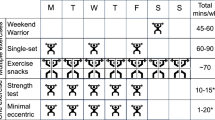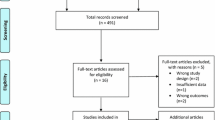Abstract
Purpose
Arterial stiffness is a strong independent risk factor for cardiovascular disease and is elevated in individuals with metabolic syndrome (MetS). Resistance training is a popular form of exercise that has beneficial effects on muscle mass, strength, balance and glucose control. However, it is unknown whether resistance exercise training (RT) can lower arterial stiffness in patients with MetS. Thus, the aim of this study was to examine whether a progressive RT program would improve arterial stiffness in MetS.
Methods
A total of 57 subjects (28 healthy sedentary subjects; 29 MetS) were evaluated for arterial structure and function, including pulse wave velocity (cfPWV: arterial stiffness), before and after an 8-week period of RT or continuation of sedentary lifestyle.
Results
We found that 8 weeks of progressive RT increased skeletal muscle strength in both Con and MetS, but did not change arterial stiffness in either MetS (cfPWV; Pre 7.9 ± 0.4 m/s vs. Post 7.7 ± 0.4 m/s) or healthy controls (cfPWV; Pre 6.9 ± 0.3 m/s vs. Post 7.0 ± 0.3 m/s). However, when cfPWV is considered as a continuous variable, high baseline measures of cfPWV tended to show a decrease in cfPWV following RT.
Conclusion
Eight weeks of progressive RT did not decrease the group mean values of arterial stiffness in individuals with MetS or healthy controls.




Similar content being viewed by others
Abbreviations
- 1RM:
-
One repetition maximum
- AGI:
-
Augmentation index
- ANOVA:
-
Analysis of variance
- AP:
-
Augmented pressure
- AS:
-
Arterial stiffness
- bDBP:
-
Brachial diastolic blood pressure
- bPP:
-
Brachial pulse pressure
- bSBP:
-
Brachial systolic blood pressure
- CCA:
-
Common carotid artery
- cfPWV:
-
Carotid to femoral pulse wave velocity
- Con:
-
Control
- cSBP:
-
Central systolic blood pressure
- CV:
-
Cardiovascular
- DBP:
-
Diastolic blood pressure
- HDL:
-
High-density lipoprotein
- ICC:
-
Interclass correlation coefficients
- IMT:
-
Intima-medial thickness
- MetS:
-
Metabolic syndrome
- RT:
-
Resistance training
- SEM:
-
Standard error of the mean
- VO2peak:
-
Peak oxygen consumption
References
Atlantis E, Martin SA, Haren MT, Taylor AW, Wittert GA, Members of the Florey Adelaide Male Ageing S (2009) Inverse associations between muscle mass, strength, and the metabolic syndrome. Metab Clin Exp 58:1013–1022. doi:10.1016/j.metabol.2009.02.027
Baechle TR, Earle RW, National Strength & Conditioning Association (US) (2008) Essentials of strength training and conditioning, 3rd edn. Human Kinetics, Champaign
Beck DT, Martin JS, Casey DP, Braith RW (2013) Exercise training reduces peripheral arterial stiffness and myocardial oxygen demand in young prehypertensive subjects. Am J Hypertens 26:1093–1102. doi:10.1093/ajh/hpt080
Bouchard C (2012) Genomic predictors of trainability. Exp Physiol 97:347–352. doi:10.1113/expphysiol.2011.058735
Bouchard C, Rankinen T (2001) Individual differences in response to regular physical activity. Med Sci Sports Exerc 33:S446–S451 (discussion S452–S443)
Bouchard C et al (1999) Familial aggregation of VO(2max) response to exercise training: results from the HERITAGE Family Study. J Appl Physiol 87:1003–1008
Brown BG et al (2001) Simvastatin and niacin, antioxidant vitamins, or the combination for the prevention of coronary disease. N Engl J Med 345:1583–1592. doi:10.1056/NEJMoa011090
Casey DP, Beck DT, Braith RW (2007) Progressive resistance training without volume increases does not alter arterial stiffness and aortic wave reflection. Exp Biol Med 232:1228–1235. doi:10.3181/0703-RM-65
Chen CH et al (1996) Validation of carotid artery tonometry as a means of estimating augmentation index of ascending aortic pressure. Hypertension 27:168–175. doi:10.1161/01.hyp.27.2.168
Chen CH, Nevo E, Fetics B, Pak PH, Yin FCP, Maughan WL, Kass DA (1997) Estimation of central aortic pressure waveform by mathematical transformation of radial tonometry pressure: validation of generalized transfer function. Circulation 95:1827–1836. doi:10.1161/01.cir.95.7.1827
Chilibeck PD, Calder AW, Sale DG, Webber CE (1998) A comparison of strength and muscle mass increases during resistance training in young women. Eur J Appl Physiol Occup Physiol 77:170–175
Collier SR, Frechette V, Sandberg K, Schafer P, Ji H, Smulyan H, Fernhall B (2011) Sex differences in resting hemodynamics and arterial stiffness following 4 weeks of resistance versus aerobic exercise training in individuals with pre-hypertension to stage 1 hypertension. Biol Sex Differ 2:9. doi:10.1186/2042-6410-2-9
Cortez-Cooper MY, DeVan AE, Anton MM, Farrar RP, Beckwith KA, Todd JS, Tanaka H (2005) Effects of high intensity resistance training on arterial stiffness and wave reflection in women. Am J Hypertens 18:930–934. doi:10.1016/j.amjhyper.2005.01.008
Croymans DM, Krell SL, Oh CS, Katiraie M, Lam CY, Harris RA, Roberts CK (2014) Effects of resistance training on central blood pressure in obese young men. J Hum Hypertens 28:157–164. doi:10.1038/jhh.2013.81
Cullen P (2000) Evidence that triglycerides are an independent coronary heart disease risk factor. Am J Cardiol 86:943–949
Currie KD, Thomas SG, Goodman JM (2009) Effects of short-term endurance exercise training on vascular function in young males. Eur J Appl Physiol 107:211–218. doi:10.1007/s00421-009-1116-4
DeVallance E, Fournier SB, Donley DA, Bonner DE, Lee K, Frisbee JC, Chantler PD (2015) Is obesity predictive of cardiovascular dysfunction independent of cardiovascular risk factors? Int J Obes 39:244–253. doi:10.1038/ijo.2014.111
Donley DA et al (2014) Aerobic exercise training reduces arterial stiffness in metabolic syndrome. J Appl Physiol 116:1396–1404. doi:10.1152/japplphysiol.00151.2014
Emre A, Oz D, Yesilcimen K, Sayar N, Ergun D (2009) Impact of the metabolic syndrome on aortic pulse pressure and ascending aortic pulsatility in patients with angiographically normal coronary arteries. Can J Cardiol 25:411–414
Fleenor BS, Marshall KD, Durrant JR, Lesniewski LA, Seals DR (2010) Arterial stiffening with ageing is associated with transforming growth factor-β1-related changes in adventitial collagen: reversal by aerobic exercise. J Physiol 588:3971–3982. doi:10.1113/jphysiol.2010.194753
Fournier SB et al (2014) Exercise reveals impairments in left ventricular systolic function in patients with metabolic syndrome. Exp Physiol 99:149–163. doi:10.1113/expphysiol.2013.075796
Fournier SB, Donley DA, Bonner DE, Devallance E, Olfert IM, Chantler PD (2015) Improved arterial–ventricular coupling in metabolic syndrome after exercise training: a pilot study. Med Sci Sports Exerc 47:2–11. doi:10.1249/MSS.0000000000000388
Heffernan KS, Fahs CA, Iwamoto GA, Jae SY, Wilund KR, Woods JA, Fernhall B (2009) Resistance exercise training reduces central blood pressure and improves microvascular function in African American and white men. Atherosclerosis 207:220–226. doi:10.1016/j.atherosclerosis.2009.03.043
Ho SS, Radavelli-Bagatini S, Dhaliwal SS, Hills AP, Pal S (2012) Resistance, aerobic, and combination training on vascular function in overweight and obese adults. J Clin Hypertens 14:848–854. doi:10.1111/j.1751-7176.2012.00700.x
Huang PL (2009) A comprehensive definition for metabolic syndrome. Dis Model Mech 2:231–237. doi:10.1242/dmm.001180
Hunter GR, McCarthy JP, Bamman MM (2004) Effects of resistance training on older adults. Sports Med 34:329–348
Ibanez J et al (2005) Twice-weekly progressive resistance training decreases abdominal fat and improves insulin sensitivity in older men with type 2 diabetes. Diabetes Care 28:662–667
Jacobson TA, Miller M, Schaefer EJ (2007) Hypertriglyceridemia and cardiovascular risk reduction. Clin Thera 29:763–777. doi:10.1016/j.clinthera.2007.05.002
Kato H, Suzuki H, Tajima S, Ogata Y, Tominaga T, Sato A, Saruta T (1991) Angiotensin II stimulates collagen synthesis in cultured vascular smooth muscle cells. J Hypertens 9:17–22
Kingwell BA, Arnold PJ, Jennings GL, Dart AM (1997) Spontaneous running increases aortic compliance in Wistar-Kyoto rats. Cardiovasc Res 35:132–137
Kraemer WJ et al (2002) American College of Sports Medicine position stand. Progression models in resistance training for healthy adults. Med Sci Sports Exerc 34:364–380
Lakatta EG, Levy D (2003) Arterial and cardiac aging: major shareholders in cardiovascular disease enterprises: part I: aging arteries: a “set up” for vascular disease. Circulation 107:139–146
Levy BI, Michel JB, Salzmann JL, Poitevin P, Devissaguet M, Scalbert E, Safar ME (1993) Long-term effects of angiotensin-converting enzyme inhibition on the arterial wall of adult spontaneously hypertensive rats. Am J Cardiol 71:8E–16E
Matsuda M, Nosaka T, Sato M, Ohshima N (1993) Effects of physical exercise on the elasticity and elastic components of the rat aorta. Eur J Appl Physiol 66:122–126
Miller MS, Bedrin NG, Ades PA, Palmer BM, Toth MJ (2015) Molecular determinants of force production in human skeletal muscle fibers: effects of myosin isoform expression and cross-sectional area. Am J Physiol Cell Physiol 308:C473–C484. doi:10.1152/ajpcell.00158.2014
Miyachi M, Donato AJ, Yamamoto K, Takahashi K, Gates PE, Moreau KL, Tanaka H (2003) Greater age-related reductions in central arterial compliance in resistance-trained men. Hypertension 41:130–135
Miyachi M et al (2004) Unfavorable effects of resistance training on central arterial compliance: a randomized intervention study. Circulation 110:2858–2863. doi:10.1161/01.CIR.0000146380.08401.99
Montero D, Roberts CK, Vinet A (2014) Effect of aerobic exercise training on arterial stiffness in obese populations: a systematic review and meta-analysis. Sports Med 44:833–843. doi:10.1007/s40279-014-0165-y
Rakobowchuk M, McGowan CL, de Groot PC, Bruinsma D, Hartman JW, Phillips SM, MacDonald MJ (2005) Effect of whole body resistance training on arterial compliance in young men. Exp Physiol 90:645–651. doi:10.1113/expphysiol.2004.029504
Rattazzi M, Bertacco E, Puato M, Faggin E, Pauletto P (2012) Hypertension and vascular calcification: a vicious cycle? J Hypertens 30:1885–1893. doi:10.1097/HJH.0b013e328356c257
Scuteri A, Najjar SS, Muller DC, Andres R, Hougaku H, Metter EJ, Lakatta EG (2004) Metabolic syndrome amplifies the age-associated increases in vascular thickness and stiffness. J Am Coll Cardiol 43:1388–1395. doi:10.1016/j.jacc.2003.10.061
Seals DR (2014) Edward F. Adolph distinguished lecture: the remarkable anti-aging effects of aerobic exercise on systemic arteries. J Appl Physiol 117:425–439. doi:10.1152/japplphysiol.00362.2014
Sharman JE et al (2006) Validation of a generalized transfer function to noninvasively derive central blood pressure during exercise. Hypertension 47:1203–1208. doi:10.1161/01.HYP.0000223013.60612.72
Skinner JS et al (2001) Age, sex, race, initial fitness, and response to training: the HERITAGE Family Study. J Appl Physiol 90:1770–1776
Stepp DW (2006) Impact of obesity and insulin resistance on vasomotor tone: nitric oxide and beyond. Clin Exp Pharmacol Physiol 33:407–414. doi:10.1111/j.1440-1681.2006.04381.x
Stuart CA et al (2013) Slow-twitch fiber proportion in skeletal muscle correlates with insulin responsiveness. J Clin Endocrinol Metab 98:2027–2036. doi:10.1210/jc.2012-3876
Tanaka H, Dinenno FA, Monahan KD, Clevenger CM, DeSouza CA, Seals DR (2000) Aging, habitual exercise, and dynamic arterial compliance. Circulation 102:1270–1275
Thomas SG, Cunningham DA, Rechnitzer PA, Donner AP, Howard JH (1985) Determinants of the training response in elderly men. Med Sci Sports Exerc 17:667–672
Vlachopoulos C, Aznaouridis K, Stefanadis C (2010) Prediction of cardiovascular events and all-cause mortality with arterial stiffness: a systematic review and meta-analysis. J Am Coll Cardiol 55:1318–1327. doi:10.1016/j.jacc.2009.10.061
Vyssoulis GP et al (2010) Differential impact of metabolic syndrome on arterial stiffness and wave reflections: focus on distinct definitions. Int J Cardiol 138:119–125. doi:10.1016/j.ijcard.2008.08.005
Wilkinson IB, Franklin SS, Cockcroft JR (2004) Nitric oxide and the regulation of large artery stiffness: from physiology to pharmacology. Hypertension 44:112–116. doi:10.1161/01.HYP.0000138068.03893.40
Williams MA et al (2007) Resistance exercise in individuals with and without cardiovascular disease: 2007 update: a scientific statement from the American Heart Association Council on Clinical Cardiology and Council on Nutrition. Phys Act Metab Circ 116:572–584. doi:10.1161/CIRCULATIONAHA.107.185214
Yarasheski KE, Pak-Loduca J, Hasten DL, Obert KA, Brown MB, Sinacore DR (1999) Resistance exercise training increases mixed muscle protein synthesis rate in frail women and men ≥76 yr old. Am J Physiol 277:E118–E125
Acknowledgments
We thank Beth Nardella for proofing the manuscript. This study was supported in part by the American Heart Association Grant 11CRP7370056 (P. D. Chantler), National Heart, Lung, and Blood Institute Grant T32-HL-090610 (S. B. Fournier), and National Institute of General Medical Sciences of the National Institutes of Health under Award U54-GM-104942 and 1P20 GM109098 (P. D. Chantler). STEM Mountains of Excellence Fellowship (E. DeVallance). The content is solely the responsibility of the authors and does not necessarily represent the official views of the National Institutes of Health.
Author information
Authors and Affiliations
Corresponding author
Ethics declarations
Conflict of interest
The authors declare no competing financial interests.
Additional information
Communicated by Fabio Fischetti.
Rights and permissions
About this article
Cite this article
DeVallance, E., Fournier, S., Lemaster, K. et al. The effects of resistance exercise training on arterial stiffness in metabolic syndrome. Eur J Appl Physiol 116, 899–910 (2016). https://doi.org/10.1007/s00421-016-3348-4
Received:
Accepted:
Published:
Issue Date:
DOI: https://doi.org/10.1007/s00421-016-3348-4




